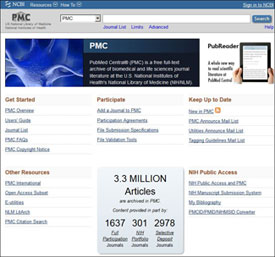HHS expands public access to research
March / April 2015 | Volume 14, Issue 2
HHS will follow NIH practices through PubMed Central to
help make federally funded research results public.

An estimated 110,000 peer-reviewed scholarly articles will be made available each year under the new U.S. Department of Health and Human Services (HHS) public access plan, announced recently. Other HHS operating divisions - including the CDC and FDA - will follow the practice developed by NIH a decade ago to make federally funded research results public.
More than 3 million papers are currently available through the NIH's National Library of Medicine's PubMed Central, a free archive of biomedical and life sciences journal literature. New areas to be included are public health, comparative effectiveness and emergency preparedness research. Another component of the plan aims to capture and make public research data, building on the existing collection at www.healthdata.gov.
"Together we can accelerate the movement of science and research into the hands of as many as possible," said HHS Secretary Sylvia M. Burwell in a letter accompanying the policy notice.
As part of the effort, NIH will be issuing for public comment a policy proposal to require all NIH-funded investigators generating digital scientific data to submit a plan addressing how, when, and where their data will be managed and shared. The policy will apply to research funded through grants, contracts, and the intramural program, and will replace the current policy, which applies only to extramural awards that request $500,000 or more in any given year.
The plan was developed in response to a White House directive that federal research agencies increase access to peer-reviewed scientific publications and digital data developed by researchers.
More Information
To view Adobe PDF files,
download current, free accessible plug-ins from Adobe's website.